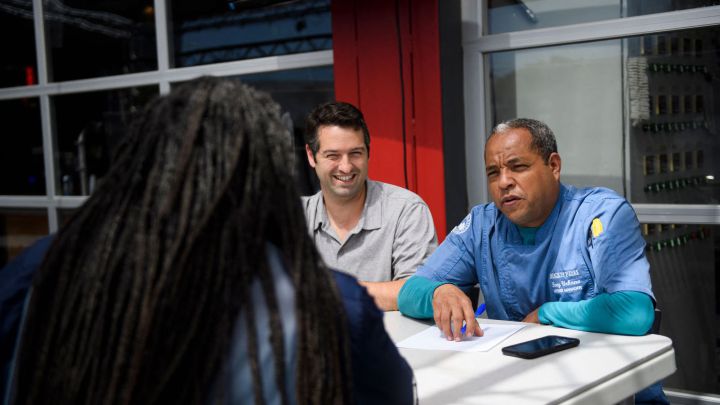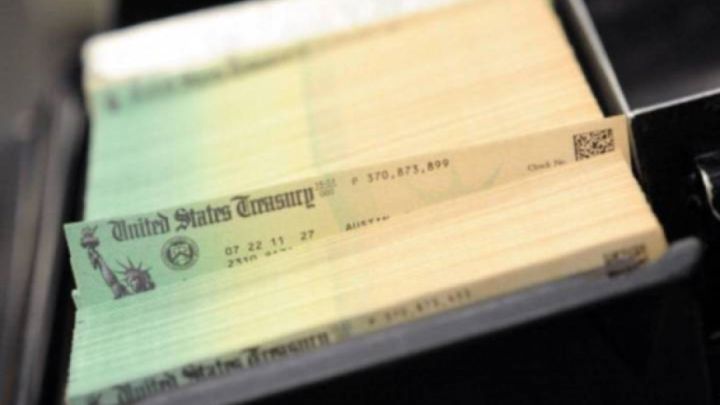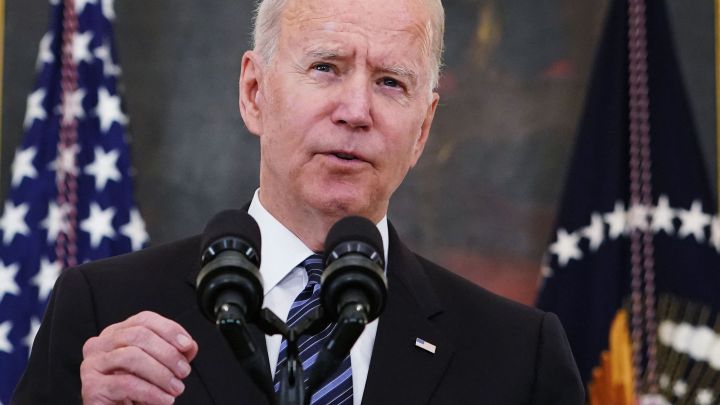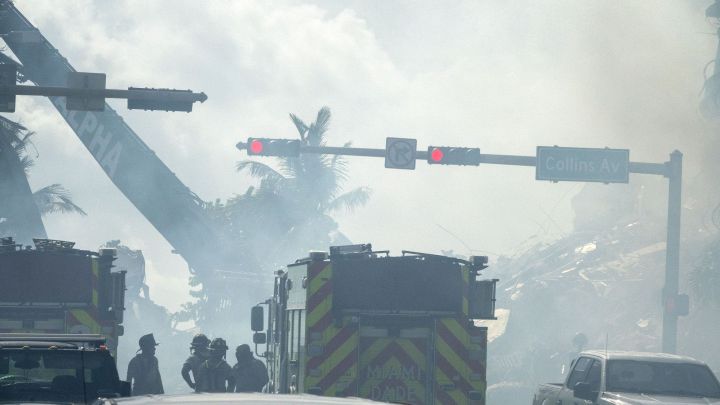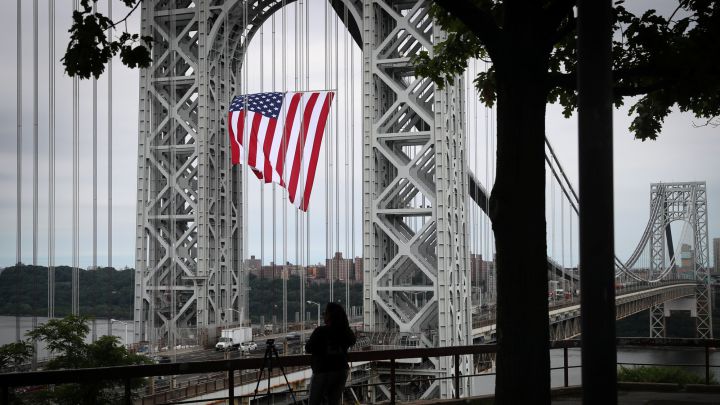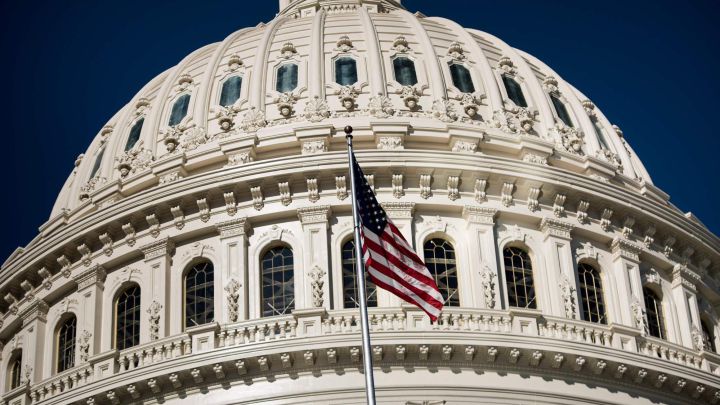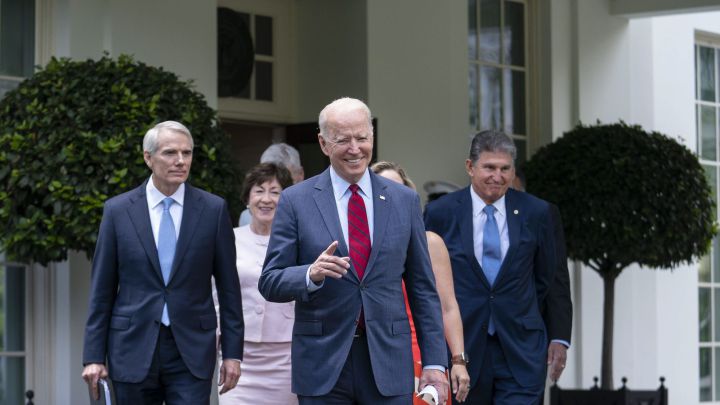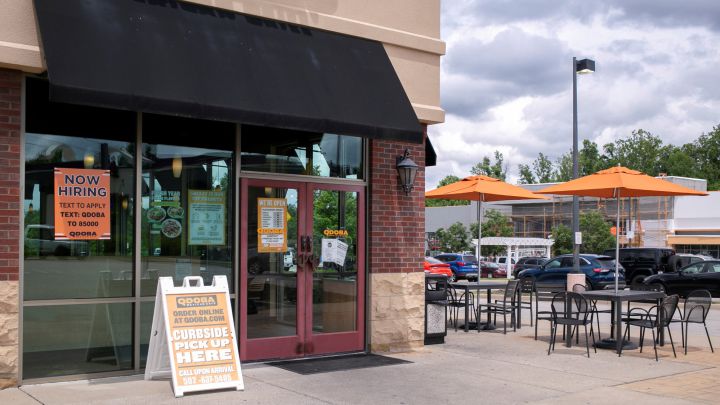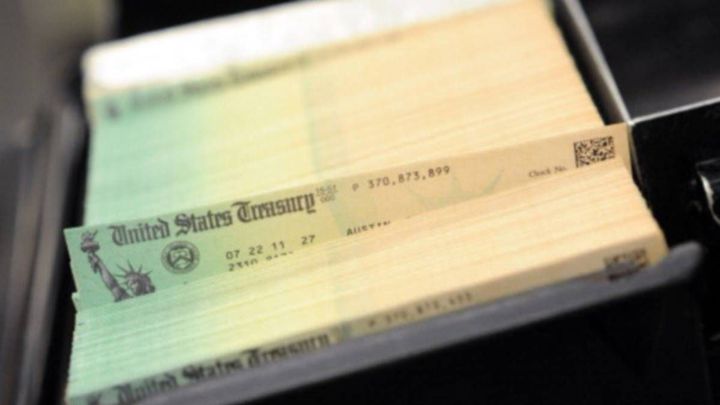Fourth stimulus check summary: 25 June 2021
Updates and information on the third stimulus check in President Biden's coronavirus relief bill, and news on a possible fourth direct payment.
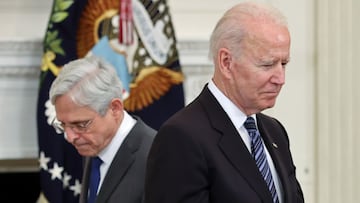
Show key events only
US Stimulus check news: Friday 25 July
California budget framework agreed
Facing a looming deadline, legislative budget officials said late Friday they had reached a framework for the state budget with Gov. Gavin Newsom, hashing out agreements on homelessness funding, health coverage for undocumented seniors and other lingering policy differences.
But the officials, who declined to speak on the record, said some key details remained unsettled, even as the Legislature prepares to pass the $262.2 billion spending plan on Monday, three days before the start of the new fiscal year.
Senator DiSanto responds to new relief budget
The Senate today approved a $40.8 billion General Fund Budget for Fiscal Year 2021-22 that continues to support Pennsylvania’s economic recovery from the covid-19 pandemic and protects taxpayers in coming years.
"This budget prudently anticipates tomorrow’s challenges and assures the Commonwealth is in a solid financial position"
Unemployment benefits in Indiana must continue: why was the decision taken?
Indiana is one of 26 states that have opted out of continuing unemployment compensation from federal pandemic programs. However jobless workers in the state sued the Governor over the decision saying that he had violated state law. A similar lawsuit has been filed in Texas.
An Indiana state judged ruled that the Hoosier state must continue to pay pandemic unemployment benefits Governor Eric Holcomb ordered stopped.
Indiana must continue to pay $300 unemployment benefits
Republican Governor Eric Holcomb ordered payments of federal enhanced unemployment benefits cease as of 19 June. Holcomb cited the lack of workers reentering the labor market due to the overly generous benefits while there was an abundance of positions available. However, jobless workers in the state filed a lawsuit saying that the Governor was in violation of the state law requiring Indiana to "procure all available federal insurance benefits to citizens."
A state judge sided with the unemployed workers and now the state will have to continue paying around 230,000 Hoosiers until the suit is decided. Indiana is one of 26 states that have ended or will end the enhanced federal pandemic unemployment programs early.
White House releases tweet comparing the bipartisan infrastructure agreement to the American Recovery Act which was passed to stimulate the economy after the Great Recession in 2009.
Bipartisan infrastructure plan in jeopardy after GOP says they are blindsided to by the President's plan pursue the measures left out of the American Rescue Plan through budget reconciliation.
Bloomberg reports that the Environmental Protection Agency (EPA) will make more than $50 million available for low-income communities of color. The package, which is funded through covid-19 relief spending of which "$16.7 million will be used to fund environmental justice grants and $7 million will fund electric school buses." Another $5.1 million will be allocated to "strengthen monitoring near low-income communities and drinking water sources for possible civil and criminal enforcement."
$500 stimulus check in New Jersey: when is it coming?
The New Jersey General Assemlby passed the $46.4 billion state budget along party lines on Thursday. The package includes $319 million for tax rebate checks of up to $500 for around three quarters of a million New Jersey families.
New Jersey middle-class families, and those aspiring to be, could start seeing a $500 tax rebate check arriving as soon as 1 July according to the Governor.
Biden insists on "human infrastructure" bill along with bipartisan infrastructure deal
Republican senators accused President Biden of blindsiding them with a major condition to pass the $1.2 trillion bipartisan infrastructure deal he agreed to on Thursday. After he announced the deal on Thursday, President Biden said he would only sign the bipartisan deal into law if Congress also passes a multi-trillion-dollar package focused on "human infrastructure" programs.
"If they don't (both) come, I'm not signing it. Real simple," Biden said.
Biden has made clear that he is pursuing a "dual-track" strategy with the two bills part of his larger Build Back Better agenda. Democrats plan to pass the second portion of the package deal through budget reconciliation that would allow them to pass the bill with a simple majority in the evenly split Senate.
President of Boston Fed supportive of stimulus policy
Eric Rosengren, president of the Boston Fed has expressed concerns about a buildup of financial stability risks linked to the low interest rate environment. Speaking on Wednesday he said "Long periods of very low interest rates do encourage people to take risk."
In an interview with Yahoo Finance Rosengren when asked about the new $1.2 trillion bipartisan infrastructure deal overheating the economy he said “We’ll see if the actual bill gets signed and what it is paired with.” Democrats are proposing a parallel bill that would include parts of the American Jobs Plan that were left out of the proposal hammered out by 21 senators and agreed to by the White House.
Rosengren did however express support for the stimulative fiscal policy that the Fed is pursuing which he says should lead to full employment by the end of the year or early next year. He added that eventually “just as monetary policy needs to normalize, so does fiscal policy.”
Miami Building Collapse: What has President Biden said in response?
A busy week for President Biden
President Biden is busy finalizing an agreement with Senators and other leaders on Capitol Hill on the new infrastructure proposal. However, the President has also found time to send Federal emergency personal to Florida to assist local and state agencies, after an infrastructure failure has led to the deaths of four people.
Read our full coverage to see what the President said in talking to Florida's governor as well as the actions the administration has taken to support those impacted by the crisis.
Oregon Legislature leaves without returning $300 million in stimulus money to residents
The three stimulus checks that have been sent out since last year are not income and so not taxable. However, in the case of Oregon and five other states they created a sticky issue that being a federal tax rebate they reduced the deduction that a resident could take on state taxes, thus upping a resident's state tax bill.
In the case of Oregon that was an average of $333 in extra state taxes resulting in a $300 million pot in the state coffers. Lawmakers are set to conclude the Legislature’s 2021 regular session on Friday or early Saturday without addressing the issue of how to return the money.
How much were the first, second and third stimulus checks and when were they sent out?
Take a look at the three federal stimulus checks sent out so far in the US since the beginning of the covid-19 pandemic.
Can signing up with the IRS portal before July help me get my payment quicker?
The answer to this question depends on your tax filing status. For those who have submitted a tax return to the IRS in recent years, the agency already has the information to distribute the payment.
For those who do not normally file, the IRS has launched a tool to ensure they have the information to get your payment as quickly as possible.
Read our coverage for more details on the payment schedule and for what new features will be added to the portal in the coming weeks.
BREAKING NEWS: Yesterday an apartment building in Miami collapsed, leaving over 150 people missing in the rubble. This is an unprecedented infrastructure failure for the United States and shows that updated building codes could be needed. Our team is covering the crisis live, feel free to follow along here.
How has the eviction moratorium impacted small landlords?
In the United States, around 6 million renters are behind on their payments. This poses a serious financial problem for individual property owners. On Thursday, 25 June, the CDC's eviction moratorium was extended one more month, a move CNBC has described as "another nail in the coffin for some struggling landlords."
Zillow has estimated that in July and August almost half a million households could have faced eviction. However, the extension does provide a bit more time for tenants to pay the rent owed or apply for state and federal relief aid that could help pay back rent. In addition, while still high the number has decreased since the passage of the American Rescue Plan which allowed some renters to pay back the rent owed.
While the group of Senators sponsoring the bipartisan infrastructure bill have reached a deal, there are still a few hurdles that will have to be overcome.
Sahil Kapur of NBC reports that Kevin McCarthy, the Republican leader of the House says that he will not support the bill if it is paired with a reconciliation bill.

US consumer spending stagnates
The U.S. dollar fell on Friday after data showed that U.S. consumer spending was flat in May, while producer price inflation came in below economists’ expectations.
Consumer spending, which accounts for more than two-thirds of U.S. economic activity, held steady following an upwardly revised 0.9% jump in April. Economists polled by Reuters had forecast consumer spending rising 0.4%.
The personal consumption expenditures (PCE) price index, excluding the volatile food and energy components, increased 0.5%, below economists’ expectations of a 0.6% increase. In the 12 months through May, the so-called core PCE price index shot up 3.4%, the largest gain since April 1992.
“The most interesting, salient takeaway from today’s data is that we’re not seeing runaway inflation,” said Boris Schlossberg, managing director of FX strategy at BK Asset Management in New York. “The Fed by holding its fire is probably on the right side of the trade at this point.”
Biden's bipartisan infrastructure deal came with sacrifices
President Joe Biden and top White House officials hailed a bipartisan, preliminary infrastructure agreement as proof that Washington - and even American democracy itself - could deliver tangible results despite huge partisan divides.
But securing the deal - which delivers a fraction of the investment he initially proposed - required the Democratic president to make big sacrifices. And its passage through Congress was thrown in doubt later Thursday, after Senate Minority Leader Mitch McConnell criticized a two-track plan to pass a second spending bill later.
The bipartisan framework is valued at $1.2 trillion over eight years, $579 billion of which is new spending.
Biden insists he will continue to fight for his priorities - including what he calls "human infrastructure" and more funding for environmental programs - in the separate Democrats-only bill, and insisted he would not sign one package without the other.
$500 tax rebates: which New Jersey residents will receive the money?
New Jersey is set to pass 2022 state budget that will send over three quarters of a million middle-class families in the state a $500 tax rebate in July.

Treasury's Yellen to attend G20 finance, climate meetings in Italy
U.S. Treasury Secretary Janet Yellen will attend the G20 finance ministers and central bank governors meeting in Venice, Italy, on July 9-10 to press U.S. policy priorities on taxes, climate change and an inclusive recovery from the covid-19 pandemic, the Treasury have confirmed.
Yellen will meet with G20 counterparts and attend the Venice International Conference on Climate with G20 counterparts on July 11. She will then travel to Brussels to meet with European Union counterparts and the Eurogroup "to discuss U.S. policy priorities and respective efforts to support the economic recovery," the Treasury said.
Yellen said on Wednesday that she is seeking to win G20 finance ministers' endorsement of the "core principles" of U.S. proposals to revamp international taxation, including a global minimum corporate tax of at least 15%.
Reuters reported on Tuesday that a draft communique being circulated ahead of the G20 meeting indicated the finance leaders would endorse a global minimum tax, although it made no reference to a specific rate.
"While in Venice, Secretary Yellen will continue to reinforce the U.S. commitment to multilateralism and advance U.S. policy priorities on global tax policy, climate change, an inclusive economic recovery, and global health," the Treasury said.

Global shares near record on U.S. infrastructure bill
Asian shares rose on Friday and a gauge of global equities edged closer to record highs after U.S. President Joe Biden embraced a bipartisan Senate infrastructure deal, raising hopes for an extended rebound in the world's largest economy.
Investors have been looking to an infrastructure agreement to extend the U.S. recovery after massive fiscal stimulus helped the U.S. economy grow at a 6.4% annualized rate in the first quarter. The plan is valued at $1.2 trillion over eight years, $579 billion of which is new spending.
Futures pointed to a higher open for share markets in Europe. Pan-region Euro Stoxx 50 futures added 0.18, DAX futures rose 0.16% and France's CAC 40 futures were up 0.17%. FTSE futures edged 0.03% higher.
"The positive market tone recognizes the potential growth benefits of the compromise, but with the smaller size tempering some of the tax implications to pay for it," said Kerry Craig, global market strategist at J.P. Morgan Asset Management.
Securing bipartisan agreement on the deal required Biden to sacrifice some of his original ambitions on schools, climate change mitigation, and support for parents and caregivers, as well as tax increases on the rich and corporations.
IRS outlines tax planning tips
The Internal Revenue Service issues the latest tips and tricks to ease the tax filing process for users.
Phoenix City Council to spend $198 million in federal Covid-19 recovery funds
Phoenix City Council has revealed how it plans to spend $198 million of the $396 million funds it received as part of the American Rescue Plan.
$40 million: Arts, business and employee assistance
$31.5 million: Mitigation and care of vulnerable populations. Funding allocated to assist homeless residents, veterans, older residents, refugees, asylum seekers and people with mental illness.
$28.8 million: Youth sports, recreation, education, after-school programs and wireless
$28 million: Households and residential assistance. $10 million of this will go to utility and rent/mortgage assistance for residents who don't qualify for the existing Emergency Rent Assistance programs.
$23 million: Infrastructure, technology and capital needs
$22 million: Revenue replacement
$24 million: Miscellaneous areas of funding. Almost $15 million will be set aside for community food and health programs.
Massachusetts lawmakers at odds over $5.3 billion relief funds
Massachusetts lawmakers have rejected proposals to spend half of the $5.3 billion which the state received as part of the American Rescue Plan. A few weeks ago, the House and Senate passed a bill that would allow them to recover unused funds and channel the money into other projects such as the new infrastructure package.
Mass. Gov. Charlie Baker had proposed allocating $1 billion of the funds towards housing, including $300 million to help first-time homebuyers in communities of color who have been disproportionately impacted by the Covid-19 pandemic. "We could do a lot with a billion dollars," he said.
Biden signed the American Rescue Plan in March. It provided $350 billion in emergency funding for state, local, territorial and Tribal governments to deal with the impact of the coronavirus pandemic. Half of those funds were released in May, with the second half set to be released to local governments next year, with certain exceptions.
US banks pass Federal Reserve stress test
On Thursday, the Federal Reserve Board released the results of its annual bank stress tests, which showed that large banks continue to have strong capital levels and could continue lending to households and businesses during a severe recession.
"Over the past year, the Federal Reserve has run three stress tests with several different hypothetical recessions and all have confirmed that the banking system is strongly positioned to support the ongoing recovery," said Vice Chair for Supervision Randal K. Quarles.
All 23 large banks tested remained well above their risk-based minimum capital requirements and as laid out previously by the Board, the additional restrictions put in place during the Covid-19 event will end. All large banks will be subject to the normal restrictions of the Board's stress capital buffer, or SCB, framework.
The infrastructure bill will help the US compete with China
White House Communications Director Kate Bedingfield spoke to MSNBC's Morning Joe programme this morning to discuss the bipartisan infrastructure bill.
"The president came out yesterday with a group of bipartisan senators, five Republicans, five Democrats, and talked about an historic deal that they have been able to strike. A negotiation, a compromise to move things forward. It's an historic package that invests in rail, bridges, roads, broadband... these are things that are going to create jobs - good paying union jobs and help us compete with China," Bedingfield said.
"The president is going to move forward on two tracks. He's going to work together with Republicans in the places we can agree on things like infrastructure, he is also going to move forward on other, huge priorities that he thinks are critical for our economy. That includes the Child Tax Credit, Universal pre-K, childcare... those are things he's going to move forward in his American Family Plan. These are investments that the American people want to see us make".
$3,000/$3,600 Child Tax Credit: which families might need to opt out?
Who should opt out of advance payments on Child Tax Credit?
Direct payments will begin showing up in the bank accounts of millions of American families on 15 July, but some may want to opt out and wait to receive the full amount in one lump sum next year.
"We need better jobs, not more stimulus"
Nela Richardson, Chief Economist at ADP, gave her thoughts on the US jobs market to CNBC's Joe Kernan on Squawk Box. It is estimated that the US still lacks around 7.6 million workers. The answer, she feels, is not as simple as just injecting more stimulus into the market. "We need better jobs. A lot of the jobs that have been lost in that pandemic hit in March and April were low-paying jobs. These jobs had lackluster wage growth - even during a 10-year expansion, it took year nine, or 10 until you saw an increase in wage growth. Now, you fast forward a year later, those jobs, that require close physical contract, not virtual jobs, the prevailing wage no longer cuts it. What we need really, is to re-skill these workers, into better jobs so that they are in a position to go into the recovery and the post-pandemic economy".
When could there be a new stimulus payment according to the experts?
From the public to economists and those in Congress, there are many voices calling for another round of direct payments.
Have stimulus checks been a boon for auto-shop owners?
It could very well be the case judging from what CNBC's Michael Santoli has reported on Twitter today.
"We have a car in the shop now (after a deer encounter) and the auto-body guy says he thinks more people have cash to cover their insurance deductible after the stimulus checks hit, and are bringing cars in for work they'd put off last year or earlier," tweeted Santoli.
No doubt, boosted spending due to the stimulus checks have prompted an upturn in several industries, and the auto-repair sector is likely no different.
US judge blocks $4 billion debt relief program for minority farmers
(Reuters) - A US federal judge on Wednesday temporarily blocked a part of the Biden administration's federal stimulus relief package that forgave agricultural debts to farmers of color.
A white farmer named Scott Wynn of Jennings, Florida, in May had challenged President Biden's plans as he faced farm loans and financial hardship during the pandemic. He said the debt relief program discriminated against him by race.
District Judge Marcia Morales Howard blocked the government's $4 billion aid package to farmers of color on Wednesday, ruling that the plaintiff had established a "strong likelihood" of the policy violating his right to equal protection under the law. Wynn, who is challenging Section 1005 of the American Rescue Plan Act, which provides debt relief to "socially disadvantaged farmers and ranchers," is likely to succeed, Howard said in the ruling filed in the Middle District Court of Florida.
The ruling added that "Section 1005's rigid, categorical, race-based qualification for relief is the antithesis of flexibility." A separate judge in Wisconsin had also granted a temporary restraining order on the debt relief plan on 10 June. The US Agriculture Department (USDA) had planned to start the payments to farmers in June.
For decades, USDA employees and programs have discriminated against socially disadvantaged farmers by denying loans and delaying payments, resulting in $120 billion in lost farmland value since 1920, according to a 2018 Tufts University analysis.
Black farmers have been promised relief from federal discrimination in the past, only to be repeatedly disappointed, Lloyd Wright, a Virginia farmer who served as the director of the USDA's Office of Civil Rights in the late 1990s and early 2000s, has said earlier. He suggests eligible farmers continue paying on loans so that they do not end up being behind if the program is permanently blocked.
McConnell 'pessimistic' about infrastructure bill
House minority leader Mitch McConnell told Fox News' Mike Emanuel how he feels about the bipartisan framework $1.2 trillion infrastructure deal which was announced by the Senate yesterday. "I was initially optimistic but it could best be described as a tale of two press conferences. After the first one, the president walked out with the bipartisan group and approves an infrastructure bill that many of my members are quite optimistic about. Then after all of those people depart the White House, the president goes out for the second press conference and says, 'Unless you pass my tax bill, I won;t sign the infrastructure bill'. The 2017 tax bill is a red line, we are not going to revisit it. I think we've gone from optimism to pessimism as a result of the president's second press conference".
Bipartisan senators hoping to get $1.2 trillion infrastructure deal over the line
President Joe Biden and a bipartisan group of senators announced on Thursday that they have reached a framework $1.2 trillion infrastructure deal just before Congress leaves town for a two-week recess. The deal involves $1.2 trillion invested in improving infrastructure over an eight-year period, with $579 billion in spending over the first five years.
Ohio Senator Rob Portman praised the deal, telling reporters, "I'm pleased to see us come together on a core infrastructure package. This is not non-infrastructure items, without new taxes, and with the commitment from Republicans and Democrats alike that we're going to get this across the finish line".
IRS online tool helps families see if they qualify for Child Tax Credit
The Treasury Department and IRS are urging families to take advantage of a new online tool that can help them determine whether they qualify for the Child Tax Credit and the special monthly advance payments beginning on 15 July.
Available exclusively on irs.gov, the new Child Tax Credit Eligibility Assistant, launched earlier this week, is interactive and easy to use. By answering a series of questions about themselves and their family members, a parent or other family member can quickly determine whether they qualify for the credit.
IRS Commissioner Chuck Rettig explained, "This new tool provides an important first step to help people understand if they qualify for the Child Tax Credit, which is especially important for those who don't normally file a tax return. The eligibility assistant works in concert with other features on IRS.gov to help people receive this important credit. The IRS is working hard to deliver the expanded Child Tax Credit, and we will be rolling out additional help for taxpayers in the near future. Where possible, please help us help others by distributing CTC information in your communities".
Will unemployment benefits be extended after May unemployment rates?
Over half of US states plan to end or have already ended enhanced federal unemployment compensation early. The latest jobs growth data showed nationally a decrease in the unemployment rate, but noticeable gains were seen in only 21 states.
The US Bureau of Labor Statistics’ May jobs report showed what in normal times would be solid growth with nearly 560,000 new jobs added. However, the numbers missed the expected target and the US economy is still short around 10 million jobs from the pre-pandemic trend in growth. This soothed fears that the economy was growing too fast but means that the jobs gap won’t be closed until August 2023 at the current pace of job creation. Enhanced federal unemployment benefits are set to expire the first week of September 2021 in the 24 states and the District of Columbia that have not yet opted out early.
Are more people applying for jobs after their state cut unemployment benefits?
CNBC reports that in Alaska, Iowa, Mississippi, and Missouri, states that ended federal pandemic related unemployment benefits on 12 June, online job searches are down 4% compared to the national average. Additionally, the data showed that in states that ended the additional payments on 19 June, "activity is 1% lower."
The data released by the job search platform Indeed, provides new insights into the way these policies are impacting the behavior of unemployed workers. According to Indeed economist Ann Elizabeth Konkel, the data "suggests the opposite dynamic of what one would expect, given the policy intent of ending benefits early."
$500 tax rebates: which New Jersey residents will receive the money?
$500 tax rebates: which New Jersey residents will receive the money?
New Jersey is set to pass the 2022 state budget that will send over three-quarters of a million middle-class families in the state a $500 tax rebate in July.
The New Jersey Democrat-led Senate passed a $46.4 billion state budget for the 2022 fiscal year along party lines. Included in the numerous middle-class tax relief measures is a $500 middle-class tax rebate that Governor Phil Murphy and lawmakers agreed to in September.
The budget fight was made easier with the state’s $10 billion windfall from sales tax collections and $6 billion in funds from the American Rescue Plan. The rebate checks to middle-class families will come from proceeds of the Millionaires Tax the state enacted in September.
Read our full coverage for more details and to see if you are eligible.
Fourth Stimulus Check: Why is another payment not included in the bipartisan infrastructure bill?
Fourth Stimulus Check: Why is another payment not included in the bipartisan infrastructure bill?
Details of the bipartisan infrastructure bill have been released, one measure that did not make the cut… another round of stimulus checks.
Many of the Senators who initially agreed to work together on an infrastructure proposal opposed the President’s trillion-dollar plan that took a wide definition of “infrastructure,” which included social aspects.
These measures ranged from increasing wages for those in the care economy to a historic investment in the country’s ability to fight climate change. While many of these investments share widespread public support, in red and blue states, it was not enough to garner any support from the Republican caucus. Additionally, Senate Minority Leader Mitch McConnell has said in recent days that his party would have never supported a bill that increased the corporate tax rate to cover the new spending.
Read our full coverage for more details including what measures made the cut in the final proposal.
The Bipartisan Infrastructure Framework will:
Improve healthy, sustainable transportation options for millions of Americans by modernizing and expanding transit and rail networks across the country, while reducing greenhouse gas emissions. The Plan is the largest federal investment in public transit in history and is the largest federal investment in passenger rail since the creation of Amtrak.
Repair and rebuild our roads and bridges with a focus on climate change mitigation, resilience, equity, and safety for all users, including cyclists and pedestrians. The Bipartisan Infrastructure Framework is the single largest dedicated bridge investment since the construction of the interstate highway system.
Build a national network of electric vehicle (EV) chargers along highways and in rural and disadvantaged communities. The largest investment in EV infrastructure in history, the Bipartisan Infrastructure Framework will accomplish the President’s goal of building 500,000 EV chargers.
Electrify thousands of school and transit buses across the country to reduce harmful emissions and drive domestic manufacturing of zero emission vehicles and components.
Eliminate the nation’s lead service lines and pipes, delivering clean drinking water to up to ten million American families and more than 400,000 schools and child care facilities that currently don’t have it, including in Tribal nations and disadvantaged communities. The Plan is the largest investment in clean drinking water and waste water infrastructure in American history.
Connect every American to reliable high-speed internet, just as the federal government made a historic effort to provide electricity to every American nearly one hundred years ago. The Framework will also drive down prices for internet service and close the digital divide.
Upgrade our power infrastructure, including by building thousands of miles of new, resilient transmission lines to facilitate the expansion of renewable energy, including through a new Grid Authority. The Plan is the single largest investment in clean energy transmission in American history.
Create a first of its kind Infrastructure Financing Authority that will leverage billions of dollars into clean transportation and clean energy.Make the largest investment in addressing legacy pollution in American history, a cleanup effort that will create good-paying union jobs and advance environmental justice.
Prepare more of our infrastructure for the impacts of climate change, cyber attacks, and extreme weather events. The Framework is the largest investment in the resilience of physical and natural systems in American history.
What's in the US Senate's $1.2 trillion infrastructure plan?
Thursday embraced a bipartisan Senate deal to spend hundreds of billions of dollars on infrastructure projects, building roads, bridges and highways and helping stimulate the economy.
Here are some of the details of the bipartisan framework released by the White House, valued at $1.2 trillion over eight years, $579 billion of which is new spending:
NEW SPENDING
* Roads, bridges and other major projects: $109 billion
* Power infrastructure, including grid authority: $73 billion
* Passenger and freight rail: $66 billion
* Broadband infrastructure: $65 billion
* Water infrastructure, such as eliminating lead pipes: $55 billion
* Public transportation: $49 billion
* Resilience (preparing infrastructure for the impacts of climate change such as floods and other extreme weather events and cyber attacks): $47 billion
* Airports: $25 billion
* Environmental remediation: $21 billion
* Creation of an Infrastructure Financing Authority focused on clean transportation and clean energy: $20 billion
* Ports, waterways: $16 billion
* Safety, including grants to add bike lanes and other steps to protect vulnerable road users: $11 billion
* Electric vehicle infrastructure, including chargers: $7.5 billion
* Electric buses, transit: $7.5 billion
* Western water shortage: $5 billion
FINANCING
The plan includes a number of proposals to finance the spending. Republicans sketched out those plans:
* Improve tax enforcement: Net increase of $100 billion after $40 billion invested in enforcement
* Public-private partnerships and "direct-pay" municipal bonds: $100 billion
* Redirecting unused Covid-19 relief funds: $80 billion
* Proceeds from 5G wireless networks spectrum auction: $65 billion
* Estimated macroeconomic impact of infrastructure investment: $58 billion
* Redirecting unused unemployment insurance money returned from US states: $25 billion
* Reinstating Superfund fees for chemicals. Superfund, the program for cleaning up the nation’s worst hazardous waste sites, was originally financed primarily through taxes on petroleum products, chemicals and corporate income: $13 billion
* Extending expiring customs user fees: $6.1 billion
* Sale of oil from the US Strategic Petroleum Reserve: $6 billion
Why are Californians with disabilities upset with Governor Gavin Newsom?
CalMattersreports that the plan to send Golden State Stimulus checks to millions across the state leaves out residents with disabilities saying, "While California lawmakers automatically sent checks to 1.2 million people who receive [Supplemental Security Insurance], the 1.2 million Californians on Social Security Disability Insurance only qualify if they had income from work in 2020."
The researchers of a new blog say that working when receiving SSDI benefits is rare and that "fewer one in five SSDI recipients work during a typical year, often because they are limited by their disabilities or risk losing their benefits if they work too much."
How will May unemployment rates impact the decision of leaders to send more stimulus?
While earlier this month data on unemployment at national level, it took the Bureau of Labor Statistics a bit longer to release state-specific information. Our team took a look at how these rates impact the decision of lawmakers to send another stimulus check.
Additionally, this data is useful in understanding the state of the labor market in more than half of the states that will be ending all federal pandemic-related unemployment insurance. Our team found that while all of these states have inched closer to their pre-pandemic unemployment rate, their economies are still recovering.
Stimulus checks live updates: welcome
Hello and welcome to our live stimulus checks blog for today, Friday 25 June 2021. We'll be bringing you updates on a possible fourth direct payment, in addition to the latest information on the third round of checks, which has seen around $395 billion go out to eligible people in the US.
We'll also be providing news on other economic-aid schemes such as the expanded Child Tax Credit, which will see monthly payments of up to $300 distributed to qualifying households.
- Coronavirus stimulus checks
- USA coronavirus stimulus checks
- Joseph Biden
- Bernie Sanders
- Unemployment compensation
- Housing prices
- Science
- Unemployment
- California
- Coronavirus Covid-19
- United States
- Pandemic
- Coronavirus
- Employment
- Home
- North America
- Money
- Virology
- Outbreak
- Infectious diseases
- Payment methods
- Microbiology
- Diseases
- America
- Medicine
- Work
- Urbanism
- Finances
- Biology
- Health
- Life sciences
